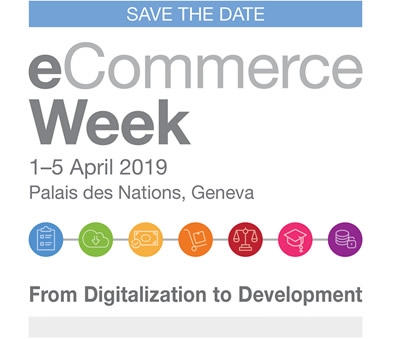Global standards for an efficient, sustainable, and inclusive cross-border e-commerce
3 Apr 2019 10:00h - 11:30h
Event report
[Read more session reports and live updates from the UNCTAD E-commerce Week]
The session ‘Global standards for an efficient, sustainable, and inclusive cross-border e-commerce’ was held on 3 April 2019 in Geneva, Switzerland, during UNCTAD’s eCommerce Week. The session provided an opportunity for discussing the Framework of Standards on Cross-Border E-Commerce by panellists from various sectors of customs administrations, relevant government agencies, and private-sector stakeholders.
Moderator Ms Ana Hinojosa (Director, Compliance, and Facilitation Customs Cooperation Council (CCC )) began by saying that there is an overwhelming amount of cross-border movement of physical goods and services, but that customs administrations are unprepared to handle the dramatic increase. She asked the panellist to share their thoughts on strategic imperatives of global customs standards. Mr Norman Schenk (Vice President, Global Customs Policy and Public Affairs, UPS) said that UPS has been playing catch up trying to find solutions to this growing problem. As a global service provider, UPS serves millions of people, and without standards, there would be global chaos. He believes it is essential to harmonise standards internationally, to avoid the risk of hundreds of overlapping regulations from individual countries. This is something the framework of standards has helped address, while still allowing flexibility, especially to developing countries that are constantly facing changes.
Mr Victor Do Prado (Director, Council and TNC Division, WTO) said that regardless of the area of business, the aim is always to maximise opportunities and minimise risks. This why he prefers a simple and secure approach. For domestic issues, governments should be included in the decision-making process, but for international issues, it would make sense to have international collaboration. In regard to international regulations, there needs to be balance, as well as an on-going dialogue between consumers, businesses, and governments. Mr Lati Matata (Coordinator, IT development, Director, Postal Technology Centre) stated his concern regarding the hundreds of thousands of people who are still not easily accessible, and are unable to receive postal service directly to their home. He feels we need to focus on establishing global standards for achieving the full potential of cross-border e-commerce, but without leaving these people behind. Matata then spoke about policy and regulation revisions at the Universal Postal Union (UPU) to ensure alignment with the supply chain and trade facilitation requirements. He also mentioned that all postal items should require electronic advance data (EAD) by 2021.
Mr Dietmar Jost (Customs and Security Advisor, Global Express Association) thinks there is intense pressure from governments, and that this pressure is moving some companies away from a multilateral approach toward protectionism. A model needs to be created and implemented, one that would support the fast movement of parcels, which would be reliable, predictable, fully electronic, and technology-driven in a trusted environment. Collaboration needs to be the central part of any such domestic, as well as international model. Currently, customs administrations are far from ensuring a seamless supply chain, so a new coherent e-commerce model is required to facilitate this. He looks forward to open global inclusive standards that are forward-looking and positive. Afterwards, an international political will would be essential in putting these standards into practice. Mr Mike Leahy (Executive Director Commercial, Program Directorate, Canadian Border Services Agency) said that customs agencies are still not ready to change their traditional approaches. Many complexities have changed, and despite problems being clear, there is hesitation to fully address them.
By Jainee FelooCabrera
Related topics
Related event

eCommerce Week 2019: From Digitalization to Development
1 Apr 2019 15:45h - 5 Apr 2019 15:45h
Geneva, Switzerland
